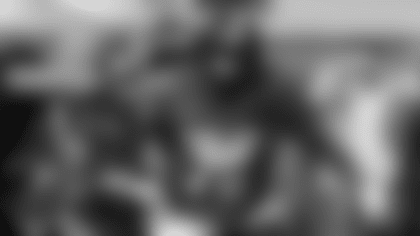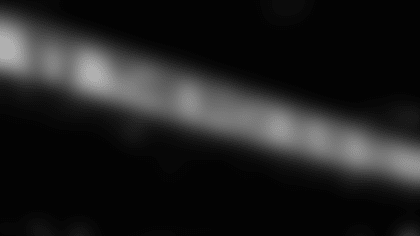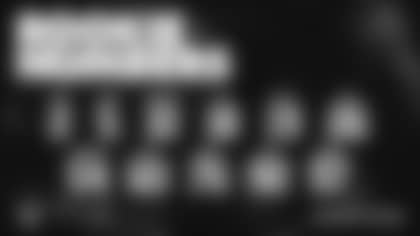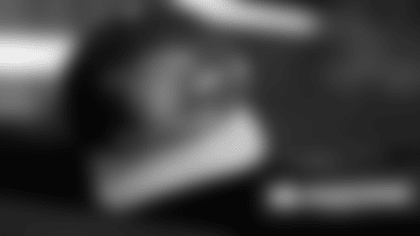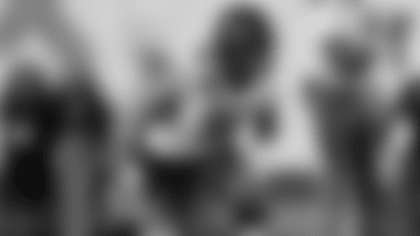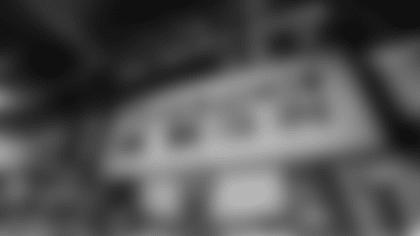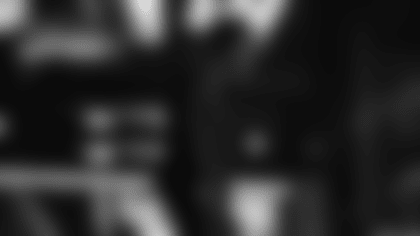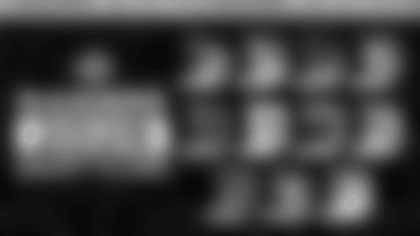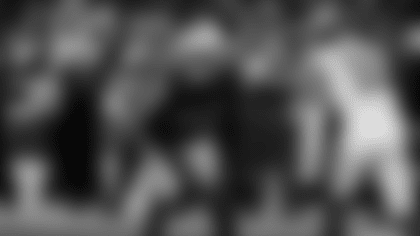McKenzie: Good evening everyone. Welcome to Alameda. I appreciate you guys taking the time out. I'm going to try to cover this Raider team here. Around this time of year, I really don't like to talk a whole lot to you guys because you guys love information and you know I'm not going to give it to you. I really want to, but the other 31 teams would have a field day, and I don't think I want to let that happen. Guys, with that being said, I'm here for you guys. Let's talk about this Raider team and where we're going.
Q: What kind of action are you getting from teams that want to move up? Are they ringing the phone off the hook to see what it's going to take to get that pick?
McKenzie: I will say this about action and how much: We're just feeling around right now. Nothing is concrete, but people are just peripheral conversation.
Q: How do you weigh whether to take that pick at No. 3 as opposed to trading it and maybe getting back into the second round?
McKenzie: Whichever deal is going to help the Raiders the most, if it's staying there and taking the pick, we'll weigh that versus what's on the floor, what is being offered. In some cases, the offer may be too good to pass up. So that's going to depend; it really will.
Q: Do you use the chart of the value of the pick or is it more of looking who is there?
McKenzie: Well, all the above. When you're making the trade, of course you defer to the chart, but really it's what your gut's telling you, what you would take if you don't stay with that pick. Yes, it's definitely going to depend on who's there. It will factor in major.
Q: Is it safe to say though that you're not calling to see what you would get for the pick; other teams are calling you?
McKenzie: Exactly. That's safe to say.
Q: You hear about players moving up and down the draft board; how much of that is true? How much is that just the media hype?
McKenzie: You know what? Personally, I would think most of it is media hype because some of the so-called insiders are talking to certain personnel people or coaches and they get information which a lot of times, at this time, it's not truthful information. You have to take that with a grain of salt. You just stay true to what you have on your board. I'm sure every team is doing that.
Q: How much do you weigh that once you're on the clock that maybe the good deals have dried up or more teams are going to be more desperate?
McKenzie: Well, I'm not going to worry too much about it. We're picking third and when our time comes, we'll make the best decision for the Raiders. I'm not going to worry too much about what No. 1 and No. 2 are doing. Now of course, they have the first and second choice, so we get the third choice. Now who they like compared to who we like, nobody knows. We'll just sit there and wait. We're not going to worry about the other two.
Q: You obviously inherited a team. A lot of players have been cut. At what point is it fair to say that the roster reflects your personality and your staff's personality or your philosophy when it comes to the team?
McKenzie: The totality of it, that's going to be ongoing, but it started when I got here, to be honest with you, with what I have to do with the roster. When do you see it start its transformation? Hopefully this season. That's my hope. So you have a good off-season, another draft, and things are coming in place. You have a new coaching staff as far as four coaches that we swapped out. So hopefully it begins to show this year.
Q: How do you balance the input from scouts who follow these guys for years probably for some of them versus the coaches who are a little newer to this as far as when they start following these college guys?
McKenzie: You take into account a whole lot of what the scouts tell you. That's the way I've been taught and that's the way I believe is the right way to do it. You get the input from, not only the coaches, but my in-house scouts also when you're talking about comparing, contrasting with our own personnel, personnel around the league, as to determine the value of the player, what the player can and can't do in this league. So you value all the information, but the information that the scouts give us, that information is vital.
Q: You have your own scouting department in place now. Last year you came in with an existing scouting department, which had to not be ideal, but you made it work. Now you have a first-round pick, your own scouts in place; what difference do you think that makes? When you have a guy like Shaun Herock next to you, who you worked with for 19 years, can you guys talk about a single player and compare him to somebody else and immediately have a reference?
McKenzie: That's what it is. It's a commonality. It's not who can do this and who can do that because some of the guys who were here last year, they were good. But it's the guys that I brought on board, there is a common denominator of we know each other. We know what each other likes. We know the players, the type of players, that it would take to not only win, but to produce at each position. So the conversations probably are quicker in trying to get a feel for what Shaun is explaining to me on a particular player. I kind of know the kind of player he likes. So from that standpoint, it's easier.
Q: When you look at staying put or possibly trading down, how much do you weigh the need for an impact player? Obviously, you guys need an impact player. Would you agree with that?
McKenzie: I would think every team needs an impact player at some point. Yes, we do weigh the importance of trying to find an impact player, absolutely.
Q: How do you differentiate between drafting for need and drafting the best player available at where you're at?
McKenzie: The key is drafting the best player. I don't think you can draft for need, especially in the first round. I think you draft the best player. You try to fill that need down the line. You can't do that (draft for need).
Q: When you draft the best player available, do you look at the player that's the best at a particular specific position or, with the roster being unsettled the way it is, does versatility play a bigger role?
McKenzie: Versatility will, but if he's versatile and not great at anything, that versatility is average and you don't want that. I want to try to get somebody that can change the game, that's a difference-maker. No matter what position, if he can make a difference, that's the one you want. Instead of a solid player, solid versatile player, versus a difference-maker, you take the difference-maker.
Q: Reggie, you have to act like you're interested in every player like Geno Smith, Joeckel, or a Fisher, if they fall to you. Is it sometimes hard to put on the act that you want everybody there?
McKenzie: The poker face. It is because it's obvious that you like certain players more than others. You can go and ask every scout in the room and you'll probably get a favorite player that differs from the other. But that's the fun part of this job is trying to get all those opinions and come to a common goal to choose one.
Q: With all the changes to the roster and the well publicized amount of dead money under the cap, I think there's a perception out there that this is almost an expansion team. Is it realistic to think that this team can compete this year? Weighing against what you need to be competitive now with what you need to be competitive in the future, do those things pull against each other?
McKenzie: I don't think so. We're trying to compete now. Now, how does that result? That's going to depend on the players' performance on the field. We're trying to add players that can help this team win, help this team compete. We're going into this season to win ballgames. You can call it expansion; it's a lot of different faces. I agree with that. But to say that we're just going to take our lumps and play ball, that's not the goal here. The goal here is to compete each and every week and win games. We'll see how that goes from training camp on. But the start is now. The moves that we had to make, we made them. We will continue to make them through training camp.
Q: The highest profile move is the new quarterback Matt Flynn. Is he the presumptive starter? Is he the starter once OTAs begin? Where is he right now?
McKenzie: As we begin the OTA period, we're going to begin with Matt Flynn. Now, the quarterbacks who will be on the roster from that point on, they will all compete. Like I said, every position, it's all about getting players that can play and competing.
Q: What about Matt from your time in Green Bay makes you believe? Obviously, he hasn't played a lot, but what did you learn in Green Bay that makes you think he can be a starter?
McKenzie: Two things that I feel are important and that's presence, as far as leadership and knowing how to move a team down the field, and knowing how to do it. He has all the intangibles and I think he can play the position. He can throw the ball. I think he's going to be a solid quarterback. Now how good can he be? We'll figure that out, but I think he's got a chance to be a good, solid quarterback. He hasn't played a lot of games so that's what's ahead of him, to see how he plays. He'll get in here and compete and try to see if he can show his team and coaches if he can play. The coaching staff doesn't really know him. I'm probably the guy who knows him best and I feel good knowing that he can play the position.
Q: A lot of people, the players and some of the coaches, are always talking about your vision, what your vision is for this team. From Green Bay I looked at their championship-year team and I think it was almost an entirely homegrown team. Forty of 53 guys had never played for another franchise. Is that what your vision is here? Is that how you want to put together a team, by identifying homegrown talent and developing it?
McKenzie: Absolutely. When you get guys that play together for awhile that's when you develop not only a core but you develop that chemistry at each and every position, and that's how you win games in the fourth quarter. You overcome adversity. That's how you become a champion. In doing that, you have to draft well. When you add certain players, they have to mesh. Yes, you want to build a team that way.
Q: So when you do have this ton of money under the salary cap next year, it would just be to pick and choose as opposed to…?
McKenzie: I'm not going to Macy's. No, we'll be selective and we'll try to continue to draft well and keep the players. That's the key. If you've got the cap and all of that to re-sign your good players, that's what you want to do. We don't want our good players this year get out of the building.
Q: Is this a down year for the quarterbacks in the draft, would you say? What's your take on the quarterback class this year?
McKenzie: I don't see Andrew Luck and RG [Robert Griffin III] or Russell [Wilson] for that matter. Those guys were…Guys are beating up this class. You're going to get some good, solid quarterbacks in this class. We can get spoiled by certain classes, so I'm not the one to beat this one up because there are going to be some players that surprise you.
Q: Do you have to evaluate defensive players differently with the amount of teams running the read-option, spread type offenses?
McKenzie: From the spread-option standpoint? Not necessarily. Those type of offenses…Now throwing the football, for these quarterbacks that can throw it, you're going to have to be okay from a defensive-backfield standpoint. From a nickel defense, rushing the passer, you have to make sure you perfect that game. You don't see as many power running teams that will run the ball consistently. You're looking for some people that can help in the passing game.
Q: How about with the new rules about contact and crown of the helmet and so forth? Did you evaluate defensive backs differently in terms of maybe wanting more coverage guys instead of big hitters?
McKenzie: No, not really. With that rule change, it's not going to be…you can teach these defensive backs how to tackle. Not many of them try to spear guys. I think we're kind of overdoing it a little bit. As a defensive player, I think those guys want to run through them with their shoulder, especially in the open field like that.
Q: Are your evaluations of college players coming out in terms of their character done the same way as you do with free agents? The free agent class that you brought in seems to have a common thread; they almost all seem to be not a lot of drama to them, pretty serious about playing. Being that college kids are younger, do you have more allowances if they have an issue in their past?
McKenzie: We all have issues. Even the guys that we signed, we've got some guys with issues. The deal is we want some guys that want to play for the Raiders .We want some guys that are going to work and that's going to do everything they can do be the best football player. When you talk about football character, you show up on time and you work as hard as you can. When it's time to leave the building, you're going to make sure that you're able to be back the next day ready to go to work and try to make this team a better team. And it's got to be about the team. We want guys that understand that. From a smart, tough standpoint, that's what we want. We want some guys that are football players and not so much want to be…there's a whole lot of wannabes. They look the part and they think they're the guy, but they're not willing to do the work. That's not going to help us win.
Q: Are you going to be aggressive for the undrafted free agents again? Like find a guy like [Rod] Streater, cast that wide net and find a gem or two?
McKenzie: Or three...yes.
Q: There a lot of talented guys in the draft who have more issues than other players do; do you have the veterans here take on some of those kind of guys that have off-field issues?
McKenzie: I think so. I think we've got a couple. Do we have the ideal group yet? Probably not because of the turnover, you've still got guys trying to feel their roles on the team now and trying to figure out who's the guy in the locker next to them. Once that's all in place, yes, we feel like we've got a handful of guys that can help that situation, absolutely.
Q: When you're picking third, there's only a few different ways it can go, so as you sit there now, if nobody comes in with a great trade, do you have a pretty good idea who your player is going to be?
McKenzie: Yes.
Q: Going into your second draft as a GM, what did you learn from the first year as the man that makes all the final decisions in the draft to change your approach this year?
McKenzie: Try to keep your first-round pick. It'll be more fun on Thursday when you've got one. With the preparation part of it, anytime you're in the first year of something when everything is new, I'm trying to get a feel for all the scouts. I'm trying to get a feel for all the coaches and the system. It was trying to get a feel for everyone, even the players, the team, the status of the team. Much better grasp of all of those going into this draft. So I feel much more at ease to where we are and who I have in that room feeding me information.
Q: How much more at ease did coaching in the Senior Bowl and being on the field at the Combine help?
McKenzie: A great deal. A great deal. Anytime you get to sit and have dinner with a group of players and watch them play video games and just listen to them fraternize amongst each other and you get to kid around with them, their guard is down. Other than being in a Combine setting, they know a million interviews are going on; they're going to be on their Ps and Qs. Not saying they weren't on their Ps and Qs at the Senior Bowl, but when they're around their teammates, you can kind of see a little bit more of the real them. I would do that again in a New York minute if they asked me. But I don't wish to be coaching in the Senior Bowl much. The timing wouldn't be right.
Q: Over your years in scouting, have you seen much change in the level of players coming out of the Ivy League?
McKenzie: I think you can, not only pinpoint the Ivy League, but you can talk about a couple of these conferences that have some of these players that not normally the team that put a lot of players into the league. They go through spurts and have a couple. This year is no different for the Ivy League. It should be a couple of guys drafted at least from there.
Q: Those of us watching from the outside, the draft often seems to move really slow. Does it go too fast for you guys sometimes on the inside?
McKenzie: You know what? It really doesn't. It doesn't go too slow, but it's not too fast. The thing that goes fast is after the draft, the college free agency. That's a whirlwind. But the draft, I like the process.
Q: Like the 49ers have 13 picks, you don't think it'll go too fast for them?
McKenzie: No, it won't be. The thing is with those 13 picks is that's when you wheel and deal and try to move those picks around. When you're doing a lot of things, whether you move that to nine picks or you try to move it to some picks next year or however you try to do it, that's when it becomes fast, when decisions have got to be made and stuff like that.
Q: A guy like the Honey Badger has to be hard to evaluate because obviously he's a talented player, but he has some off-field issues. At some point do you go with a gut feeling at the end of it after all the homework and research is done and have to pretty much take a leap of faith and decide what you think?
McKenzie: Yeah, as far as him off the field, yeah. You just have to go with your gut and right or wrong, you went with your gut, not with all the he-said, she-said stuff. You got all the information in front of you, you interview him, you talk to him and you go with it. Yay or nay. Whatever decision you make, that's your decision. Make it.
Q: That's done a while back; that's not done Thursday?
McKenzie: Yeah.


